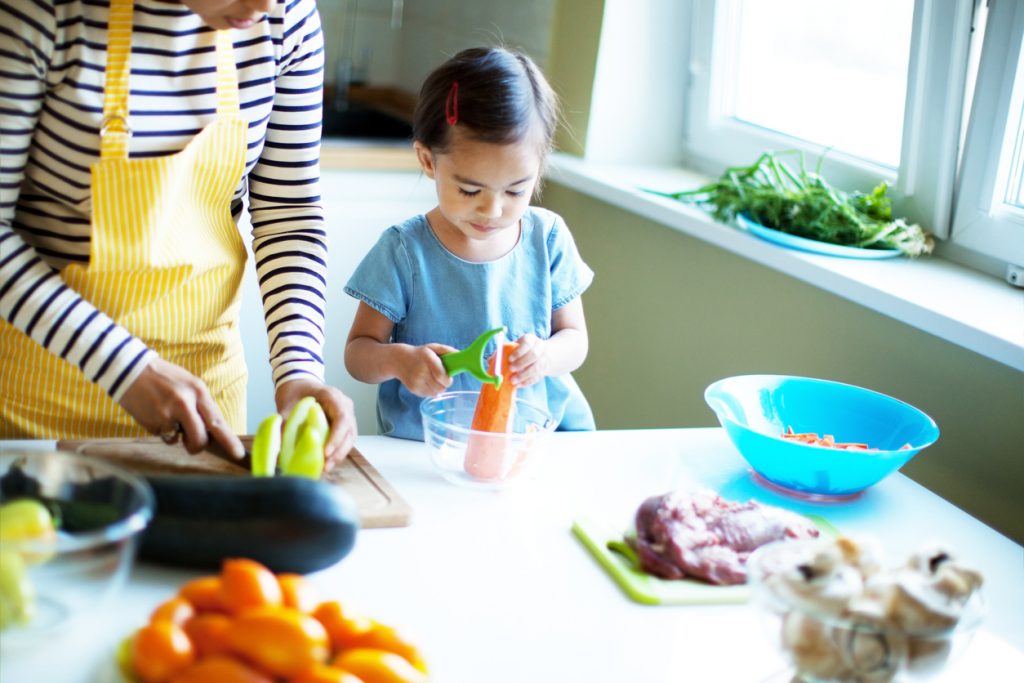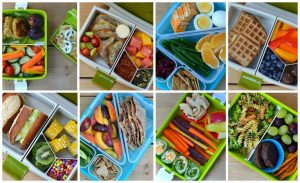Age-Appropriate Cooking Tasks for Kids

Spending time with your kids in the kitchen is a wonderful way to connect with them while teaching good eating habits, confidence, and independence.
When kids participate in food selection and prep work, they begin to understand how they can play an active role in what and how they eat. It’s also super fun for them and, let’s face it, we all like to do what’s fun!
I’ve brought my two girls into the kitchen with me since they were old enough to stand and watch. I can tell you from first-hand experience that it has shaped their relationship with food in a very positive way. To me, that’s incredibly important when it comes to helping them build lifelong healthy eating habits.
Here are some helpful ways to introduce your kids to the kitchen and to a whole new relationship with food.
Start with safety when introducing cooking tasks for kids
Okay – so this part isn’t always the most fun, but it’s important. Once your child is in the kitchen with you, attentive and ready to begin, run through some basic safety instructions. Set age-appropriate rules and let them know what’s on or off-limits.
Remind them to:
- Ask an adult’s permission before cooking
- Listen to your instructions
- Wash their hands before handling food
- Understand food safety around vegetables, meat, fish and poultry
- Understand rules around the stove and oven
- Clean up after themselves
Remind your kids that rules are different in every household and for different ages, but that they must be followed to ensure everyone’s safety. For example, kids under 5 should not use sharp knives, but perhaps you’re okay with a small paring knife and the introduction of knife skills for your 6-year-old. Whatever guidelines you set and are comfortable with should be introduced early on and can evolve as your kids’ skill level progresses.
Focus on the fundamentals of cooking
Once safety rules have been established, it’s time to get started! Depending on the age of your child, introduce them to appropriate tasks that help them get started slowly so they can build confidence before moving on to more complex responsibilities. As you work with different foods, talk to them about where it comes from, how it was grown and other details. Kids will learn to appreciate where their food originates, and the many steps involved in its production.
Some age-appropriate cooking tasks for kids include:
3-5 years – Washing, smashing, kneading, and tearing are all great tasks for this age. Motor skills are still developing now, so allowing your kids to perform tasks that don’t require set amounts or detailed measurements will ensure they feel accomplished and have fun.
5-8 years – At this age, you can begin to introduce beginner knife skills and next-level kitchen skills that involve better hand-eye coordination. Allow your kids to read recipes and the measurements on cups and spoons. This will allow them to understand when cooking needs to be exact and when they can experiment.
9-12 years – Kids at this age, depending on maturity, may be ready to perform certain cooking tasks on their own. Have your child make one or two simple meals per week with pre-determined ingredients and instructions. This will allow them to show off their skills, help out the family and even experiment a bit if encouraged.
13-18 – Teens interested in cooking may be ready at this stage to take on a dinner a week. If they’re not ready to go solo, invite them to start with side dishes. Put them in charge of salads or dessert, which offer variety and a chance to choose from different options.
Cultivate cleanliness in the kitchen
As you move through the various stages of cooking with your children, teach them to clean as they go and to keep their workspace tidy. Once the meal has been prepared, have them help with the cleanup so they can appreciate the effort of cooking from start to finish. They won’t do it perfectly, none of us do, but if you encourage excitement and curiosity around food from an early age, your kids are more likely to develop a love, or at least an appreciation, for cooking.
Nurture nutritional awareness
Developing an understanding of how foods provide nourishment and keep us strong is fundamental to cultivating healthy eating habits as your kids grow. Knowledge is power and offering your children the ability to choose foods with an understanding of how they will affect their health is empowering. That’s not to say your kids won’t choose unhealthy options here and there, of course they will, but it allows them to make educated choices and over time, to incorporate healthier decisions more often.
For some extra guidance, introduce your kids to the new and improved version of Canada’s Food Guide, which provides tips and suggestions on how to be more mindful with food, how to get cooking together more often, and a beautiful visual that will help your child understand portion sizes and appropriate food group options. And for more information on a variety of topics surrounding health and nutrition, visit canada.ca.















